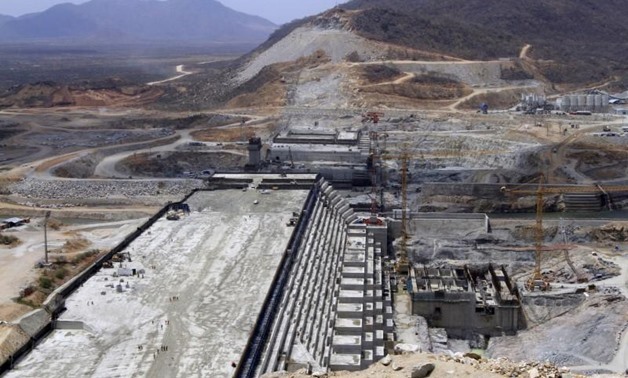
A general view of Ethiopia's Grand Renaissance Dam is seen during a media tour along the river Nile in Benishangul Gumuz Region, Guba Woreda, in Ethiopia March 31, 2015 - AFP.
CAIRO - 30 March 2020: Sudanese Prime Minister Abdalla Hamdouk announced that he will visit Cairo and Addis Ababa soon to resume the stalled negotiations on the controversial Grand Ethiopian Renaissance Dam (GERD), according to a statement from the Sudanese cabinet.
In a phone call with US Secretary of Treasury Steven Mnuchen on March 26, 2020, Hamdouk said that the Washington-held meetings on the dam with the Foreign Ministers and Ministers of Water Resources of Egypt, Sudan, and Ethiopia have reached a great achievement, the cabinet said.
The Sudanese Prime Minister also affirmed that the file of the dam is a pressing issue and the three countries should resume the negotiations to reach a final agreement on it.
In a statement by the US Treasury Department, both officials discussed the impact of the coronavirus on the people of Sudan and the strain placed on their health system.
“They discussed the importance of international cooperation. The Secretary and the Prime Minister also reaffirmed their commitment to reach a fair solution on the Grand Ethiopian Renaissance Dam,” the statement read.
Late February 2020, the US, WB-brokered talks between Egypt, Ethiopia and Sudan reached a deadlock after Ethiopia abstained from attending the meeting.
Ethiopia had announced at that time that it would continue to build the Renaissance Dam and fill the reservoir, regardless of the interests of the other countries. The Ethiopian announcement came in response to an American statement, which emphasized that the final trial and the filling of the Renaissance Dam's reservoir should not be carried out without reaching a joint agreement among Ethiopia, Egypt, and Sudan.
Since then, Egypt diplomatically has been lobbying against the Ethiopian intransigence concerning the dam issue; Egyptian Foreign Minister Sameh Shoukry made European and African tours to discuss the file of the Ethiopian dam with a number of world leaders.
On March 21, 2020, Egyptian Minister of Water Resources and Irrigation Mohamed Abdel-Atti said that Ethiopia aims to impede reaching an agreement on the rules of operating the dam and filling its reservoir with the Nile water.
In an interview with the “DMC Evening” talk show on the DMC channel, the minister added that Egypt has asked Ethiopia to not fill the dam’s reservoir with water during the drought period or to allow small quantities of water to not cause harm to Egypt’s share. However, he added, the Ethiopian side does not want to abide by any commitments, saying “we have given ultimate flexibility.”
The difference between Egypt, Sudan, and Ethiopia dates back to May 2011 when Ethiopia started building the dam; Egypt voiced concern over its water share [55.5 billion cubic meters]. Three years later, a series of tripartite talks between the two countries along with Sudan began to reach an agreement while Ethiopia continued the dam construction.
In 2015, the three countries signed the Declaration of Principles, per which the downstream countries [Egypt and Sudan] should not be negatively affected by the construction of the dam. Since then, the talks have been resumed, but In October 2019 blamed Addis Ababa for hindering a final agreement concerning a technical problem, calling for activating the Article No. 10 of the Declaration of Principles, which stipulates that if the three countries could not find a solution to these differences, they have to ask for mediation.


Comments
Leave a Comment